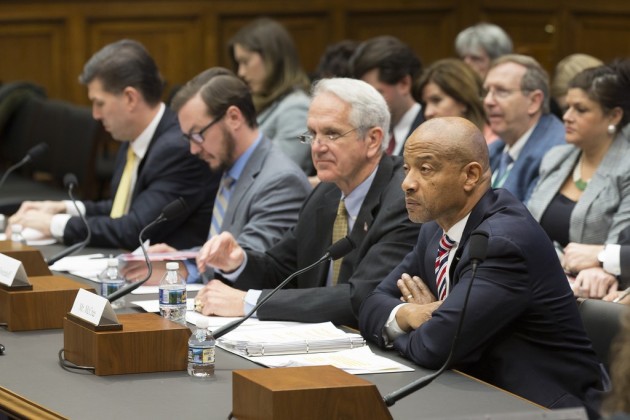Opioid Crisis in America

Members of U.S. House of Representatives' Energy and Commerce committee's subcommittee on Energy listen to testimonies during a hearing. Courtesy: U.S. House of Representatives
WASHINGTON — As the United States wrestles with the largest drug addiction epidemic in the nation’s history, policy reform advocates used their own experiences with addiction to push legislators to find solutions to the national emergency during a third hearing on the nation’s opioid crisis before the House Energy and Commerce Committee and Health subcommittee.
The advocates, who included parents, surviving family members and recovering addicts, said that the most effective solutions to the crisis lie in increased funding for treatment programs and public awareness of non-addictive pain management drugs.
They are life-or-death factors, said Kathy O’Keefe, who lost her son to heroin addiction in 2010. O’Keefe attended the hearing with a stack of more than 30 photos of families affected by opioid addiction.
“These are not statistics,” she told the legislators. “They are not numbers. They are families. We need to help these people. Let’s give them the opportunity. Let’s give them a drug to stop that craving.”
More than two million Americans are dependent upon prescription drugs or have abused them. According to a report from the Centers for Disease Control, over 63,000 drug overdose deaths were reported in the United States in 2016, more than the number of Americans killed in the Vietnam War or the Korean War.
It amounts to an average of at least 115 overdose deaths per day. Of them, 66.4 percent were opioid related. Common opioids include heroin, hydrocodone, oxycodone and fentanyl, which is a highly-potent synthetic drug.

Cathy O'Keeffe (very end) provides her testimony as families and committee
members look on. Photo by Maya King
Michael Gray, CEO and co-founder of Actus Analytical, told the committee how he lost his daughter to an accidental fentanyl overdose in January. Citing stress, the increasing potency of opioid drugs and a lack of oversight of medical providers as contributors, Gray testified that the national crisis was far-reaching and growing still. Fentanyl poses an especially unique risk to users because of its potency, he said. According to scientists at the National Center for Biotechnology Information, it is 80 times more potent than heroin and hundreds of times more potent than morphine.
Gray said he attended Thursday’s hearing to advocate on behalf of often overlooked populations within the opioid epidemic: mentally ill patients who use opioids to curb side-effects of their diseases and intermittent or experimental users.
“These users have been with us a long time,” Gray explained. “Many would have used some and moved on. Today they’re dying.”
The House Committee on Energy and Commerce is reviewing nearly 70 different pieces of legislation related to the opioid crisis. According to Heath subcommittee chairman Michael Burgess (R-Texas), members are about one week away from narrowing them down to a few critical resolutions that could eventually become bills.
One of which is the Comprehensive Opioid Recovery Centers Act, that would provide federal funding to designated treatment centers for those struggling with addiction to receive patient-centered care to treat addiction to opioids and other commonly abused substances.
The bill is co-sponsored by committee ranking member Gene Green (D-Texas) as well as Greg Guthrie (R-Ky.) and Sen. Shelley Moore Capito (R-W.Va.).








